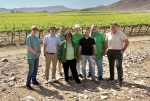The mining sector currently allocates a substantial portion of its total procurement budget, averaging between 60% percent and 80% percent, to local businesses and suppliers, vice president Netumbo Nandi-Ndaitwah has said.
Speaking at the recently held mining expo and conference, Ndaitwah said that she was delighted to learn that the mining sector has made significant strides in advancing local content, particularly in the area of local procurement.
“However, there is always room for improvement, especially in the production of mining inputs. We believe there is a significant opportunity to deepen the mining value chain in Namibia by producing our own inputs where it is economically viable,” she said, adding that in the government’s vision to create increased economic opportunities for youth and the Namibian population at large, the government is actively engaged in discussions to finalise the local content policy for the oil and gas sector.
“This policy aims to ensure that Namibians can benefit from every part of the value chain. By doing so, we are committed to maximising the economic impact of our natural resources, fostering local expertise, and ensuring that the wealth generated from these industries contributes directly to the prosperity of our people. The value addition that we have committed to ourselves, we mean it, and we are asking our partners to understand our position and to collaborate with us, as in a partnership each partner should benefit.”
Mining and exploration continue to be the main contributors to Namibia’s economy in terms of creating direct and indirect employment opportunities for Namibians. Moreover, the mining industry’s contribution to government revenue saw a significant increase from N$4.4 billion in 2022 to N$6.8 billion in 2023.
Nandi-Ndaitwah further noted that she was glad to note that later in this program, the “National Database of Mining Goods and Services” will be launched.
This initiative aims to assist Namibian entrepreneurs in identifying commercial opportunities within the mining sector.
“We believe this project will be instrumental in achieving some of our national local content objectives in mining, fostering greater economic participation and growth for our local businesses. In this regard, I call upon and encourage the responsible government ministries and departments, financial institutions, including development banks, education institutions, and partners to provide the necessary support and assist young entrepreneurs to finance and develop their business proposals to enable them to benefit from the growing economic opportunities in the mining supply chain.
“It is a must that as a county we have to invest in education and training specifically for the mining and oil and gas industries to empower our people to take the lead for the benefit of all. I therefore call on strong cooperation between the industries and training institutions. We must have targeted human capital development. In the same vein, I am calling on our graduates to also pay attention to these industries where they will be able to get jobs and where re-skilling is possible to do so in order for our youth to get employment. Also, we are calling on the partners to work with the government to strengthen the TVET training institutions,” explained Nandi-Ndaitwah.
Related to local content is the public discussion of ownership in the mining and oil and gas as products, Nandi-Ndaitwah said, adding that the issue of ownership of the natural resources is clear, as they belong to Namibians, naturally and constitutionally.
“What we need is a clear law that will protect that ownership and attract investments in Namibia’s mining sector. Currently, technical engagements are underway to work on the law. Similarly, consultations with all stakeholders in the finalisation of that law are a must. Mining is a very important industry, as it is critical to bring up our strategic industry, agriculture.”
“I wish to emphasise that the mining industry is not a sunset industry but is alive with opportunity for us to take advantage of. By cultivating and supporting continued investment into exploration, we increase the probability of discovering new mines and extend the life of mines at existing mines and thereby ensure this sector continues to grow. However, we must always keep it in the back of our minds that minerals are not a renewable resource; therefore, we should be cognisant of what we are leaving behind for the next generation,” said Nandi-Ndaitwah.










